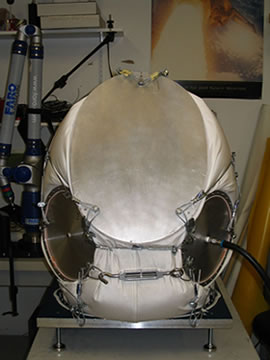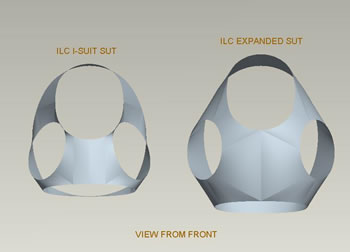Morphing Upper Torso
 The University of Maryland Space Systems Laboratory and ILC Dover LP have developed a novel concept: a soft pressure garment that can be dynamically reconfigured to tailor its shape properties to the wearer and the desired task set. This underlying concept has been applied to the upper torso of a rear entry suit, in which the helmet ring, waist ring and two shoulder rings make up a system of four interconnected parallel manipulators with tensile links. This configuration allows the dynamic control of both the position and orientation of each of the four rings, enabling modification of critical sizing dimensions such as the inter-scye distance, as well as task-specific orientations such as helmet, scye and waist bearing angles.
The University of Maryland Space Systems Laboratory and ILC Dover LP have developed a novel concept: a soft pressure garment that can be dynamically reconfigured to tailor its shape properties to the wearer and the desired task set. This underlying concept has been applied to the upper torso of a rear entry suit, in which the helmet ring, waist ring and two shoulder rings make up a system of four interconnected parallel manipulators with tensile links. This configuration allows the dynamic control of both the position and orientation of each of the four rings, enabling modification of critical sizing dimensions such as the inter-scye distance, as well as task-specific orientations such as helmet, scye and waist bearing angles.
Half-scale and full-scale experimental models as well as an analytical inverse kinematics model were used to examine the interconnectedness of the plates, the role of external forces generated by pressurized fabric, and the controllability of the system. The kinematics of the system were investigated, and tensile forces in the links were quantified to determine actuator requirements. A third experimental model was developed to eliminate material effects and thereby quantify the loads born by the pressure garment, thus allowing further understanding of the behavior of this highly complex system. This lightweight, resizable, dynamically reconfigurable suit certainly makes the MUT concept appealing as a candidate for a next generation planetary exploration suit.

Project advisor: Dr. David Akin
Lead graduate student: Shane Jacobs
Acknowledgements
The Morphing Upper Torso is under development at the University of Maryland Space Systems Laboratory, part of the Aerospace Engineering Department and the A. James Clark School of Engineering. Thanks to Jeff Braden who started this project with Shane and Dave in 2005. Also thanks to Dave Graziosi and his team at ILC Dover for initially funding this project, providing the full scale model, and for their advice and support. As well a special thanks to undergraduate students Ali Husain and Adam Mirvis.

